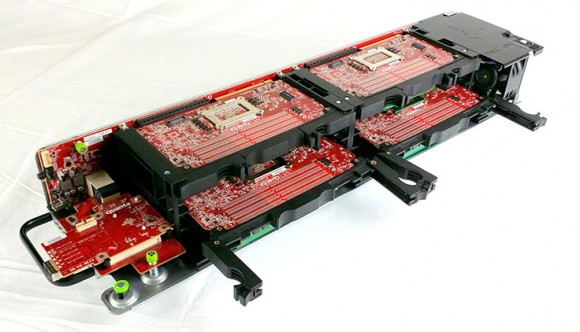Facebook has presented at the OPC Summit in San Jose, California, his first system-on-a-chip (SoC) for a modular server system that is part of the Open Compute Project makes freely available. The code-named Yosemite (not to be confused with Apple’s recent OS X version 10.10) developed SoC supports up to four independent servers and also promises higher performance and lower cost per watt than traditional data center server.
“In hardware design, there are two approaches to the enormous computational requirements of sites such as Facebook to meet,” said Facebook engineer Hu Li in a blog post. “There is the recognition of the ‘scale-up’, ie provide ever more computing power in a given system. Or you can ‘scale out’ operate by building a growing fleet of simple systems, each of which has a moderate level of computing power. “

Facebook’s SoC Yosemite was for a modular server system designed (Picture: Facebook).
Facebook’ve chosen the modular housing on the basis of Yosemite SoC for the latter approach the capacity of its infrastructure in to adapt demand increases, so Hu Li on. The system is fully compatible with Open rack and can accommodate up to 192 SoC server cards in a single rack. Mellanox allows with his equally under the Open Compute Project developed mezzanine card ConnectX-4 also multi-host support.
Yosemite each server node consists of a plug-in module next to the SoC multiple memory channels with standard DDR -DIMM slots, comprising at least one SSD interface and a management controller. The power consumption of the server SoC itself is 65 watts, the. Of the entire server card at 90 watts Each system consists of up to four cards and consumes a maximum of 400 watts. It follows Hu Li According to a “cost-effective, flexible and easy-to-maintain system structure.”
Also on the OCP Summit in Silicon Valley, Facebook has made available with OpenBMC an open software framework for system administration on GitHub. In a blog entry Facebook developers Tian Fang leads to from “BMC Software is usually created by hardware manufacturers during the development phase of the hardware. Because the BMC software was not disclosed, could, whatever was developed for the existing hardware can not be re-used for the next generation. The long-term BMC Software schedule had a direct impact on the development of new hardware. If the hardware development ended, and the BMC Software development was stopped. For more bug fixes or new features we had to wait for the hardware manufacturer. “
These limits are no longer valid with OpenBMC. The framework includes a bootloader (u-boot), a Linux kernel, open source packages and board-specific initialization scripts and tools. BMC stands for Baseboard Management Controller that is embedded on the motherboard of many systems and manages the interface between the software system management or the hardware. Using sensors, the BMC gets data about system parameters such as temperature, fan speed, or operation status and inform the Administrator upon request of any unusual values.
[With material from Rachel King, ZDNet.com]
Tip : Are you a Facebook expert? Check your knowledge – with 15 questions on silicon.de
.
No comments:
Post a Comment